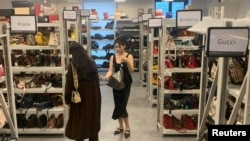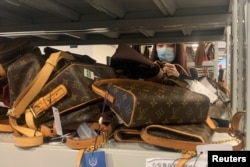China’s used luxury goods market is growing at a time when the economy is slowing down, market experts and business owners say.
Buyers in China's $74-billion luxury goods market have historically purchased new products — not used ones.
Zhu Tainiqi is the Shanghai-based founder of second-hand, or used, luxury goods marketplace ZZER. Business has been so good that Zhu is now looking for shop space to expand the business.
The business owner, age 33, has seen an increase in people wanting to sell their Hermes Birkin bags or Rolex watches. In addition, Zhu has seen increased interest from buyers who want to save some money.
"More and more people are now aware they can sell luxury goods for some money and the buyer side is noticing that they can get a great deal," said Zhu. "They think, 'Why not give it a shot?'"
He said the number of ZZER's consigners, or people putting up their goods for sale, has increased 40 percent so far in 2022 over the same period last year. The business now has 12 million members and expects to sell 5 million luxury pieces this year.
The resale market’s growth could have big effects on the business plans of the world's big luxury goods makers. They are dealing with decreased demand in China, an important market.
Iris Chan is a partner and head of client development at Digital Luxury Group, a market research group.
Chan suggested luxury makers will likely have to "think about how they're going to handle this (resale) market, and what role they are going to play in the whole process."
China's second-hand luxury market is expected to grow to $30 billion in 2025 from $8 billion in 2020.That information, released late last year, comes from the business research group iResearch. New estimates from this year have not yet been released.
Office worker Wang Jianing is exploring second-hand luxury products.
"My consumption will definitely be downgraded (this year), but I still like what I like, and I can't control the desire to buy it," she told Reuters.
Besides ZZER, other Chinese companies, such as Feiyu, Ponhu and Plum, are getting attention. Each of them gained tens of millions of dollars in investments in 2020 and 2021.
Experts expect local companies to control China's luxury resale marketplace, at least in the short term. International companies such as Vestiaire Collective and The RealReal have not yet entered the mainland China market. They told Reuters that they have no immediate plans to do so.
Handbags remain the top-selling item on luxury websites like ZZER, but Zhu said sales of watches and jewelry are also growing fast.
Prada Messengers or Fendi Baguettes, luxury handbags for women, cost 30 to 40 percent less on resale websites than in luxury stores. But the price difference for some products has widened as more people sell goods online.
I’m John Russell.
Casey Hall and Xihao Jiang reported on this story for Reuters. John Russell adapted it for VOA Learning English.
_________________________________________________________________
Words in This Story
luxury –n. something that is costly but not necessary
second-hand –adj. not new; having had a previous owner; used
handle – v. to deal with (a person, situation, etc.) successfully
consumption – n. the act of buying things
downgrade – v. to lower in extent, quality, or value
handbag – n. a woman's small bag or purse used for carrying personal things and money
_________________________________________________________________
We want to hear from you.
We have a new comment system. Here is how it works:
- Write your comment in the box.
- Under the box, you can see four images for social media accounts. They are for Disqus, Facebook, Twitter and Google.
- Click on one image and a box appears. Enter the login for your social media account. Or you may create one on the Disqus system. It is the blue circle with “D” on it. It is free.
Each time you return to comment on the Learning English site, you can use your account and see your comments and replies to them. Our comment policy is here.







Forum